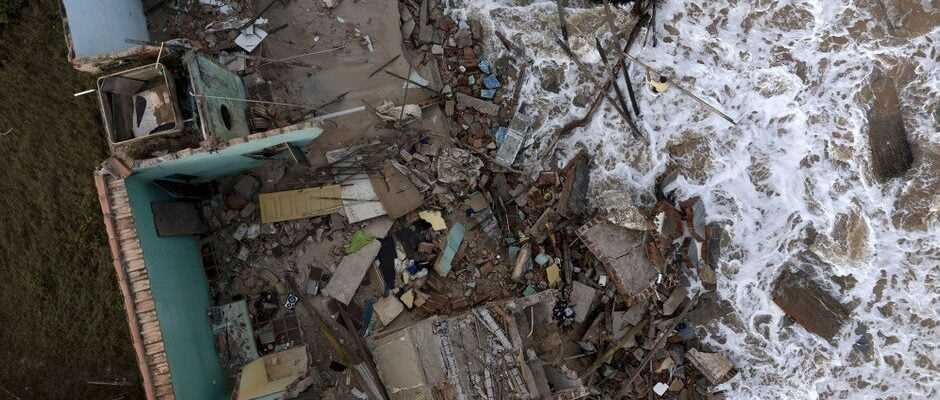Atafona, a seaside town north of Rio de Janeiro, Brazil, is gradually disappearing under the ocean, which is gaining an average of six meters per year on land.
The vultures prowl on the sand, among the rubble of the last houses submerged by the tide. Atafona, a seaside town north of Rio de Janeiro, is gradually disappearing under the ocean, which is gaining an average of six meters per year on land. More than 500 houses have already been submerged, on 2 kilometers of seafront. One of the next will be that of Joao Waked Peixoto.
By making his way through the smashed beams or the pieces of tiling which litter the ground, this business manager shows the extent of the damage in the last house which separates his from the ocean. All that remains are the blue walls of the back bedroom, a bicycle and a few other signs of recent occupancy.
In the risk zone, near the coast, only 180 houses, where 302 inhabitants live, remained standing. “When are we going to have to leave in our turn? The sea has advanced three to four meters in a fortnight, our wall could fall next week”, confides to AFP Joao Waked Peixoto, who moved during the pandemic in the second home built by his grandfather in Atafona.
Previously, he lived like the rest of his family in Campos dos Goytacazes, a charmless town of 500,000 inhabitants four hours by road from Rio, which lives off the oil industry. “It’s sad to think that we are going to lose such a beautiful house, with so many family memories,” he laments.
But it is inevitable.
Extreme erosion
Some 4% of coastlines around the world see the sea advance more than five meters per year on its land. Atafona is one of them. The situation is set to worsen, in the long term, with “the rise in sea level”, due to global warming, and in the short and medium term, “with the exceptional swell and long periods of rain or drought “, explains the geologist Eduardo Bulhoes, of the Federal Fluminense University. But beyond the extreme erosion, Atafona has suffered from another “chronic problem” for decades. “Due to human action, the volume of water in the Paraiba do Sul River has drastically reduced over the past 40 years, as well as its ability to bring sediment to the mouth,” Atafona explains. the geologist, pointing in particular to mining or agricultural activities.
Due to the lack of sediment, the sand on the beach does not renew itself naturally and the ocean is gaining ground on the land. Not to mention the construction of dwellings by the sea, which eliminates the first line of natural defence: dunes and vegetation. Result: the coastline has turned into a pile of rubble that repels tourists.
The community of around 600 fishermen is also suffering from the drying up of the river. “The big boats no longer pass at the mouth, we can no longer earn a living. The river is dead,” laments Elialdo Bastos Meirelles, head of the local fishermen’s association.
“Feel like crying”
Several projects have been presented to the town hall in an attempt to curb erosion: one of them provides for the construction of dykes, another to bring sand extracted from the bottom of the river to the beach. The idea of transporting sand, formulated by Eduardo Bulhoes, is inspired by successful experiences in the Netherlands, Spain or the United States, to “rebuild the beach together, with nature, using its strength”. But so far, no measures have yet been implemented.
The municipality of Sao Joao da Barra, a town of 36,000 inhabitants on which the hamlet of Atafona depends, pays a housing allowance of 1,200 reais (about 200 euros) per month to more than 40 displaced families.
Environment Deputy Alex Ramos says the implementation of any plan to curb erosion depends on the approval of environmental bodies. “At the moment, we have not yet seen a project that allows us to say: the problem will be solved,” he explains.
But some residents denounce a lack of political will. “We’ve heard a lot of promises (…), but it’s an abandoned city, a vision of the apocalypse, and it makes you want to cry,” says Veronica Vieira, president of the SOS Atafona association.
Any reproduction prohibited
